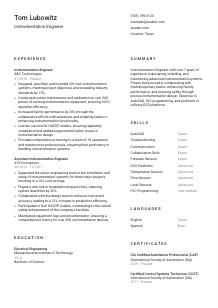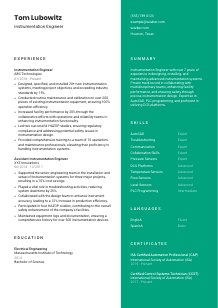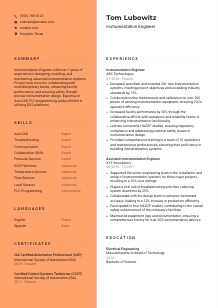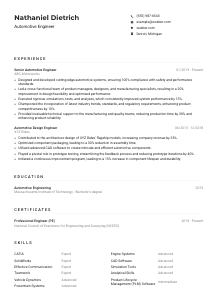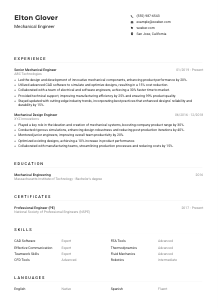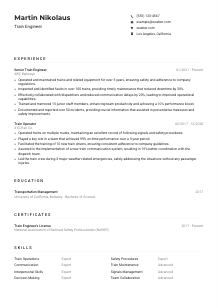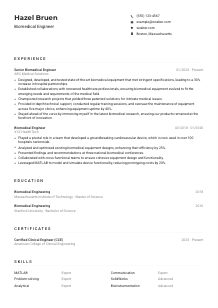Instrumentation Engineer Resume Example
Fine-tuning measurement systems, but your resume isn't hitting the right frequencies? Delve into this Instrumentation Engineer resume example, composed using Wozber free resume builder. You'll see how effortlessly you can calibrate your engineering expertise to align with job signals, harmonizing your career path with opportunity's top notes!
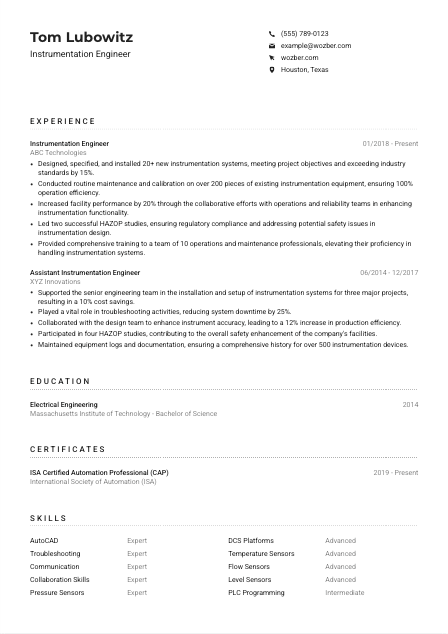
How to write an Instrumentation Engineer Resume?
Welcome aboard, future Instrumentation Engineer trailblazer! In the realm of precision and efficiency, your resume is more than just a paper trail. It's the blueprint of your professional journey, designed to navigate through the competitive landscape and land you in the heart of opportunity. Armed with the Wozber free resume builder, this guide will illuminate the path to crafting an ATS-compliant resume that resonates deeply with the Instrumentation Engineer role you're eyeing.
Ready to engineer a resume that powers up your career prospects? Let's begin this transformative journey.
Personal Details
The Personal Details section, though it appears straightforward, is your initial handshake with potential employers - make it count. For a role as nuanced as an Instrumentation Engineer, every detail must be precisely aligned with the job's demands. Here's how to craft this section with surgical accuracy.
1. Name That Commands Attention
Your name is the lead on this engineering blueprint. Ensure it's prominently displayed with a clear, professional font. Think of it as your personal brand logo, which should be unmissable.
2. Title Echoing The Job Role
Right beneath your name, position the title 'Instrumentation Engineer,' matching the job description. This ensures that at a glance, your resume speaks directly to the role, making a seamless connection.
3. Essential Contact Information
Include your phone number and a professional email address, formatted in a simple and straightforward manner. This ensures there's no barrier to getting in touch.
4. Geographic Harmony
Location can be a deal-maker. If you're based in, or willing to relocate to Houston, Texas, as the job demands, highlight this upfront. It assures the hiring manger of your logistical compatibility.
5. Digital Professional Presence
A professional LinkedIn profile or portfolio website can offer a deeper dive into your expertise. Ensure these links are current and reflective of your resume.
Takeaway
The Personal Details section, seemingly simple, sets a professional tone for your Instrumentation Engineer resume. It's your first opportunity to communicate your alignment with the job's logistical and professional prerequisites. Craft this section with clarity – it's your opening pitch.





Experience
As an Instrumentation Engineer, your experience is a testament to your mastery over complex systems. This is where your resume truly comes to life, showcasing your direct impact on projects and operations. Let's delve into optimizing your Experience section, ensuring it's a mirror reflection of your adeptness.
- Designed, specified, and installed 20+ new instrumentation systems, meeting project objectives and exceeding industry standards by 15%.
- Conducted routine maintenance and calibration on over 200 pieces of existing instrumentation equipment, ensuring 100% operation efficiency.
- Increased facility performance by 20% through the collaborative efforts with operations and reliability teams in enhancing instrumentation functionality.
- Led two successful HAZOP studies, ensuring regulatory compliance and addressing potential safety issues in instrumentation design.
- Provided comprehensive training to a team of 10 operations and maintenance professionals, elevating their proficiency in handling instrumentation systems.
- Supported the senior engineering team in the installation and setup of instrumentation systems for three major projects, resulting in a 10% cost savings.
- Played a vital role in troubleshooting activities, reducing system downtime by 25%.
- Collaborated with the design team to enhance instrument accuracy, leading to a 12% increase in production efficiency.
- Participated in four HAZOP studies, contributing to the overall safety enhancement of the company's facilities.
- Maintained equipment logs and documentation, ensuring a comprehensive history for over 500 instrumentation devices.
1. Dissect the Job Description
Begin by analyzing the job description, identifying keywords and phrases such as 'design, installation, and maintenance of instrumentation systems.' These will be your guiding stars as you weave your experience narrative.
2. Structure with Precision
Adopt a reverse-chronological format, starting with your most recent role. Include the job title, company name, and the dates of your tenure to layout a clear professional timeline.
3. Engineer Your Achievements
For each role, zero in on accomplishments that resonate with the job description. Did you ‘design and install 20+ new instrumentation systems'? These real-world applications of your skills are gold.
4. Numerical Validation
Quantify your achievements wherever possible. Statements like ‘increased facility performance by 20%' provide tangible evidence of your impact and elevate your narrative.
5. Relevance is Key
Ensure every accomplishment and duty listed directly aligns with the responsibilities and requirements of the Instrumentation Engineer position you're targeting. This isn't just about showcasing experience; it's about proving fit.
Takeaway
The Experience section is the core of your Instrumentation Engineer resume, a platform to showcase not just what you've done, but how well you've done it. It's about painting a vivid picture of your engineering prowess through real-world impacts. Approach this section as a narrative of your professional journey, highlighting the waypoints that demonstrate your instrumental value.
Education
For an Instrumentation Engineer, the Education section is more than a list of qualifications; it's the foundation of your expertise. It needs to articulate not only where you've come from, but how your academic journey has equipped you for the challenges of this role. Let's sculpt this section into a testament of your preparedness.
1. Identify Educational Must-Haves
Starting off, pinpoint the educational criteria directly from the job listing. In this case, a 'Bachelor's degree in Electrical, Electronics, or Instrumentation Engineering' is non-negotiable.
2. Lay the Framework
Keep your education timeline clear and straightforward, featuring your degree, the institution, and your graduation year. This clarity makes it easy for the hiring manager to verify your credentials.
3. Degree Specification
Directly list your degree as it applies to the job description. If you have a 'Bachelor of Science in Electrical Engineering,' make sure it's clearly highlighted as such, aligning perfectly with what's sought.
4. Relevant Coursework and Projects
Though not always necessary, highlighting specific courses or projects that are directly relevant to Instrumentation Engineering can underscore your specialization and readiness for the role.
5. Additional Academic Achievements
If there are accolades, extracurricular activities, or other achievements that underscore your commitment and prowess in your field, this is the place to showcase them, especially if they bolster your specific relevance to the Instrumentation Engineering discipline.
Takeaway
Your educational background does more than fulfill a requirement; it's a narrative of your foundational expertise, the bedrock of your engineering acumen. Ensure it resonates with what the employer is seeking, portraying you as not just a candidate, but a well-prepared engineer ready to tackle the complexities of the role.
Certificates
In the evolving field of Instrumentation Engineering, certifications act as badges of your dedication to professional growth and technical proficiency. Each certificate you earn is a reinforcement of your commitment and an enhancement to your expertise. Let's navigate how best to highlight these accomplishments.
1. Match with Job Requirements
Initially, filter through your certificates to identify those that align intimately with the responsibilities or technologies outlined in the job description. For this role, certifications like 'ISA Certified Automation Professional (CAP)' speak volumes.
2. Select With Purpose
Quality trumps quantity here. Prioritize certifications that demonstrate proficiency in skills directly relevant to the Instrumentation Engineer position, such as PLC programming or DCS platforms.
3. Period of Validity
For certifications with a shelf-life or recent acquisitions, note the date to convey current proficiency and commitment to staying abreast of industry standards.
4. Continuous Learning
In a field that's constantly evolving, your pursuit of new certifications reflects an appetite for growth and adaptation. Highlight recent or ongoing certifications to show you're on the cutting edge.
Takeaway
Your certificate section is a trophy case of your professional development within the Instrumentation Engineering discipline. It's a compelling showcase not just of where you've been, but more importantly, of your drive for continual learning and excellence. Let each certification you list underscore your candidacy with a narrative of dedication and forward momentum.
Skills
Your Skills section is the toolset you bring to the engineering table. For an Instrumentation Engineer, this isn't just about listing software proficiencies; it's about illustrating a harmonious blend of technical expertise, problem-solving prowess, and the ability to collaborate across disciplines. Let's refine your professional toolkit to make it ATS-friendly and resonate strongly with your target role.
1. Extract Key Skills
Start by extracting both explicit and implicit skills mentioned in the job description. Phrases like ‘strong proficiency in using instrumentation design tools' and ‘exceptional communication' should guide your skills list.
2. Prioritize and Align
Focus on the most pertinent skills that align with the instrumental aspects of your job role, including both hard skills like 'AutoCAD,' 'PLC programming,' and soft skills such as 'collaboration' and 'communication.'
3. Organize with Clarity
Divide your skills into technical and interpersonal, and rank them from most to least proficient. This clear depiction helps the hiring manager quickly gauge where your strengths lie in relation to the job's needs.
Takeaway
In the arsenal of your Instrumentation Engineer resume, your skills section should stand out as a comprehensive toolkit, neatly organized and clearly aligned with the demands of the role. This is your chance to prove you're not only equipped but also primed for the challenges and opportunities the position entails. Let every skill you list be a building block towards showcasing your match for the job.
Languages
In the interconnected world of engineering, linguistic agility can be a distinct advantage, bridging communication gaps and fostering collaboration across global teams. Whether your role demands proficiency in specific languages or you possess multilingual capabilities as part of your skill set, here's how to showcase your language prowess effectively.
1. Job's Linguistic Requirements
First, assess if the job explicitly requires proficiency in certain languages. For our Instrumentation Engineer role, ‘Proficient English language use is a job necessity' is a clear directive.
2. Position Languages Strategically
Lead with languages that are directly relevant to the job's requirements. For instance, placing 'English: Fluent' at the top of your language list instantly assures your fit for this role's communication demands.
3. Diversify Your Linguistic Portfolio
Other languages can enrich your resume, showcasing adaptability and a global mindset. Include these, but ensure they're positioned after your proficiency in the job's required language.
4. Honesty in Proficiency
Clearly define your language proficiency levels. For English, if it's your working language, denoting 'Fluent' ensures clarity about your ability to function effectively in a professional setting.
5. Tailor to the Role's Scope
Consider how your language skills might serve the broader objectives of the position. If the Instrumentation Engineer role involves liaising with international suppliers or stakeholders, additional languages could be a considerable asset.
Takeaway
Your language section is more than a list; it's a reflection of your ability to navigate complex, multicultural engineering environments. Even if English proficiency is the prime requirement, don't shy away from showcasing additional languages. Each language you speak is a testament to your ability to adapt, communicate, and thrive in a global engineering landscape.
Summary
Your Summary is like the executive overview of an intricate engineering project; it's concise, compelling, and rich in information. Crafting a precise summary aligns your profile with the Instrumentation Engineer role and sets the stage for a deep dive into your professional narrative. Let's engineer a summary that encapsulates your essence.
1. Decode the Job's Core
Grasp the essence of the job role from the get-go. Understand that phrases like ‘design, installation, and maintenance of instrumentation systems' are key components of your professional summary.
2. Craft Your Opening Line
Begin with a punchy statement that positions you as an adept Instrumentation Engineer, mentioning your years of experience and core areas of expertise right off the bat.
3. Highlight Role-Relevant Skills
List your standout skills and major achievements, ensuring they resonate with the job description. Terms like ‘designed and installed 20+ new instrumentation systems' directly parallel the job's demands.
4. Brevity is Your Friend
Your summary should be succinct, no more than a few lines, offering a snapshot of your professional caliber. Think of it as the teaser that entices hiring managers to want to know more about you.
Takeaway
Your summary is the gateway to your resume, offering a compelling overview of your Instrumentation Engineer credentials in a few potent sentences. This is your chance to make a memorable first impression. Concisely echo the job's requirements and articulate your unique value proposition. Let this section set the tone for the narrative of professional excellence that unfolds in the pages that follow.
Launching Your Instrumentation Engineer Journey
Congratulations on refining your resume to the apex of ATS optimization and job relevance! With this guided precision, your tailored Instrumentation Engineer resume, born out of Wozber's free resume builder including ATS-friendly resume templates and ATS resume scanner, is now a calibrated instrument ready to chart your course toward your next career milestone. Embrace this moment as the launchpad of your professional odyssey. The facets of your expertise are now aligned with the pulsating demands of the job market.
Propel forward with confidence, as your refined resume opens new frequencies of opportunity. The engineering world awaits the harmonics of your ingenuity.

- Bachelor's degree in Electrical, Electronics, or Instrumentation Engineering.
- Minimum of 5 years of hands-on experience in the design, installation, and maintenance of instrumentation systems in an industrial setting.
- Strong proficiency in using instrumentation design tools such as AutoCAD, DCS platforms, and PLC programming software.
- Demonstrated ability to troubleshoot and calibrate various types of instrumentation, including pressure, temperature, flow, and level sensors.
- Exceptional communication and collaboration skills to work effectively with multidisciplinary teams and stakeholders.
- Proficient English language use is a job necessity.
- Must be located in or willing to relocate to Houston, Texas.
- Design, specify, and install new or upgraded instrumentation systems to meet project objectives and industry standards.
- Conduct routine maintenance, calibration, and troubleshooting activities to ensure proper operation of existing instrumentation equipment.
- Collaborate with operations, maintenance, and reliability teams to improve facility performance, efficiency, and safety through instrumentation enhancements.
- Lead or participate in HAZOP (Hazard and Operability) studies, ensuring the instrumentation design meets safety and regulatory requirements.
- Provide technical support and training to operations and maintenance teams on instrumentation systems and procedures.





